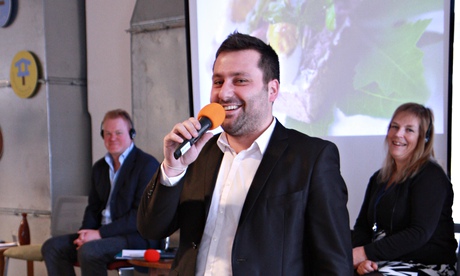Government Grants
Business Grants
Home Owner Programs
Federal Programs
About Us
Alumni Engagement Innovation Fund (AEIF)
AEIF provides alumni of U. S. government-sponsored and facilitated exchange programs with funding to expand on skills gained during their exchange experience to design and implement innovative solutions to global challenges facing their community.
Since its inception in 2011, AEIF has funded nearly 500 alumni-led projects around the world through a competitive global competition.
AEIF is designed to help U. S. government exchange alumni develop and implement projects that support U. S. foreign policy objectives, promote shared interests, and benefit local communities.
All AEIF projects must 1) convene alumni from different exchange programs to build or expand an alumni network capable of working together on common interests and increase regional and global collaboration of alumni, 2) strengthen the relationship between alumni and the U. S. government to work together on activities that address mutual goals and challenges, and/or 3) support alumni as they develop their leadership capacity and implement projects in their communities.
This year, pending availability of funding, AEIF 2025 will accept public service projects proposed and managed by teams of at least two (2) alumni.
Proposals must address at least one of the below-mentioned themes and demonstrate a commitment to Diversity, Equity, Inclusion, and Accessibility (DEIA) principles.
They should illustrate how the project will support and advance equity with respect to religion, income, geography, gender identity, sexual orientation, and/or disability.
Proposals that do not address the theme as outlined in the program objectives will be deemed ineligible.
All project activities must take place outside of the United States and its territories.
This cycle, the Public Diplomacy Section welcomes proposals in the following themes:
Education Partnerships Proposals in this area may focus strengthening links between U. S. and Mozambican education institutions at the secondary and tertiary level.
Examples include joint research projects that pair Mozambican and U. S. students and academics to address shared topics of concern, such as climate change, trades fields, migration, economic growth, history, culture, food security, inclusion, accessibility, STEM, and tech access.
Vocational and technical training is also welcome.
English Language Learning Proposals in this area may focus on one or more of the following:
expanding access to English language education through teacher training programs, direct teaching of English language to targeted groups, curriculum development, expanding language learning resources, professional development, linking English language learning with career development, and improving Mozambican’s English level for prerequisite testing for admission to U. S. institutions of higher learning.
Social Impact Entrepreneurship Proposals in this area develop entrepreneurship ecosystems, by supporting social impact entrepreneurship endeavors that address environmental, educational banking, agricultural, health and accessibility, technological, and infrastructure challenges with for-profit businesses solutions.
Proposals may support capacity-building for aspiring entrepreneurs, certifications, and access to seed funding enterprises with a significant social impact.
Special emphasis will be given to proposals that are inclusive and demonstrate scalability after the proposal period is complete.
Strengthening Media Ecosystem Proposals in this area should enhance press freedoms and improve the capacity of journalists (senior and aspiring), to improve reporting standards, the quantity and quality of investigative reports, and increase media literacy for the public.
This includes focusing on countering dis/mis information, as well as media access for underserved areas of Mozambique and underserved populations, including people with disabilities and those who only speak vernacular languages.
Initiatives may focus on promoting collaboration between Mozambican and U. S. media organizations that deliver key improvements in countering disinformation, establishing ethical journalism standards, improving journalist safety, and increasing the sustainability of independent media outlets.
Since its inception in 2011, AEIF has funded nearly 500 alumni-led projects around the world through a competitive global competition.
AEIF is designed to help U. S. government exchange alumni develop and implement projects that support U. S. foreign policy objectives, promote shared interests, and benefit local communities.
All AEIF projects must 1) convene alumni from different exchange programs to build or expand an alumni network capable of working together on common interests and increase regional and global collaboration of alumni, 2) strengthen the relationship between alumni and the U. S. government to work together on activities that address mutual goals and challenges, and/or 3) support alumni as they develop their leadership capacity and implement projects in their communities.
This year, pending availability of funding, AEIF 2025 will accept public service projects proposed and managed by teams of at least two (2) alumni.
Proposals must address at least one of the below-mentioned themes and demonstrate a commitment to Diversity, Equity, Inclusion, and Accessibility (DEIA) principles.
They should illustrate how the project will support and advance equity with respect to religion, income, geography, gender identity, sexual orientation, and/or disability.
Proposals that do not address the theme as outlined in the program objectives will be deemed ineligible.
All project activities must take place outside of the United States and its territories.
This cycle, the Public Diplomacy Section welcomes proposals in the following themes:
Education Partnerships Proposals in this area may focus strengthening links between U. S. and Mozambican education institutions at the secondary and tertiary level.
Examples include joint research projects that pair Mozambican and U. S. students and academics to address shared topics of concern, such as climate change, trades fields, migration, economic growth, history, culture, food security, inclusion, accessibility, STEM, and tech access.
Vocational and technical training is also welcome.
English Language Learning Proposals in this area may focus on one or more of the following:
expanding access to English language education through teacher training programs, direct teaching of English language to targeted groups, curriculum development, expanding language learning resources, professional development, linking English language learning with career development, and improving Mozambican’s English level for prerequisite testing for admission to U. S. institutions of higher learning.
Social Impact Entrepreneurship Proposals in this area develop entrepreneurship ecosystems, by supporting social impact entrepreneurship endeavors that address environmental, educational banking, agricultural, health and accessibility, technological, and infrastructure challenges with for-profit businesses solutions.
Proposals may support capacity-building for aspiring entrepreneurs, certifications, and access to seed funding enterprises with a significant social impact.
Special emphasis will be given to proposals that are inclusive and demonstrate scalability after the proposal period is complete.
Strengthening Media Ecosystem Proposals in this area should enhance press freedoms and improve the capacity of journalists (senior and aspiring), to improve reporting standards, the quantity and quality of investigative reports, and increase media literacy for the public.
This includes focusing on countering dis/mis information, as well as media access for underserved areas of Mozambique and underserved populations, including people with disabilities and those who only speak vernacular languages.
Initiatives may focus on promoting collaboration between Mozambican and U. S. media organizations that deliver key improvements in countering disinformation, establishing ethical journalism standards, improving journalist safety, and increasing the sustainability of independent media outlets.
Related Programs
Educational and Cultural Exchange Programs Appropriation Overseas Grants
U.S. Department of StateRelevant Nonprofit Program Categories
Obtain Full Opportunity Text:
See Related Document Tab
Additional Information of Eligibility:
The following not-for-profit organizations are eligible to apply: • Alumni Associations • Organizations led by or partnering with USG alumni • An individual (leading the project team) • Applicants must be alumni of a U. S. government-funded or sponsored exchange program or a U. S. government-sponsored exchange program (https://j1visa.state.gov/).
• Projects teams must include teams of at least two (2) alumni.
• Alumni who are U. S. citizens may not submit proposals, but U. S. citizen alumni may participate as team members in a project.
• Alumni teams may be comprised of alumni from different exchange programs and different countries.
Note: Applications must be submitted by exchange alumni or alumni associations of USG exchange alumni.
No other organizations are eligible to apply.
Exchange alumni can partner with not-for-profit or non-governmental organizations, think tanks, and academic institutions to implement project activities.
The grant can be issued to the individual alumni or the partner organization.
For-profit or commercial entities are not eligible.
Full Opportunity Web Address:
http://www.nsf.gov/publications/pub_summ.jsp?ods_key=nsf25510
Contact:
Agency Email Description:
For Inquiries
Agency Email:
Date Posted:
2024-11-14
Application Due Date:
Archive Date:
2025-02-16
Social Entrepreneurship
Spotlight
Digbeth: The New Social Enterprise Quarter

Digbeth in Birmingham, England has been appointed as the new social enterprise quarter. Social enterprises are sprouting up in the area, comprising of 57 of these businesses flanked between High Gate and Hurst Street.

